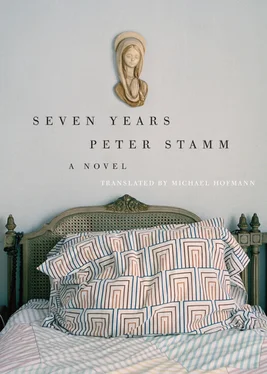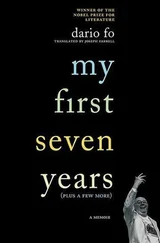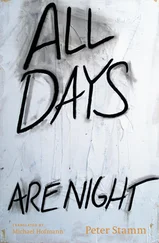And how do you like your guinea pig? asked Antje. We’re just classmates, I said. At the most, we might enter a competition together one day. Didn’t you notice that Sonia wants more from you? I shook my head. She’s got no time for a relationship. And you believe her when she says that? asked Antje with an ambiguous smile. I don’t think she’s in love with me. Nor do I, said Antje. It would be wrong to expect too much of her.
We went on drinking and talking. Antje seemed to get a kick out of unsettling me. Her boyfriend lived in Munich, she said, and that was fine by her. She couldn’t stand having a man around her all the time, it would interfere with her work. I expect you want to get married and start a family? I don’t know, I said. If you want to get married, Sonia’s the perfect wife. She’s beautiful, intelligent, cultivated, and she’s a good sort. That’s not enough, I said. I don’t think you’re cut out for a great love, said Antje. Nor am I, by the way, either.
She had only really fallen in love once, she said, when she was twenty, with a man fifteen years older. Georg was Antje’s teacher at art school. He lived in Hamburg, and only traveled down to Munich every other week, to look at his students’ work. He had a wife and four children, as he’d told Antje right at the start. To begin with, their relationship wasn’t much more than an affair.
But then over time I got to become more and more of a second wife to him, said Antje, he took me along to openings, introduced me to important people, and helped to find me a gallery. She was the only student who had had a gallery before she graduated. She liked being the lover of a prominent painter, and Georg had treated her well, taking her to expensive restaurants and giving her presents.
After graduation, Antje fell into a hole, she couldn’t deal with her newly won freedom, and had no more ideas. She worked like a lunatic and got nowhere. Georg was her last connection to the art scene. When he came to Munich, she perked up for a few days, touring the galleries with him, staying up all night. But he had new students, young talents, who were more of an inspiration to him than she was. I was just the one he fucked, she said. The more Georg turned away from her, the more she clung to him. She was getting nowhere with her painting, so she devoted all her energies to jealousy.
He had one very talented student, said Antje, I don’t think there was anything between them, but I couldn’t think straight anymore. I trailed him from the Academy once, and followed him when he went out drinking with his class. I sat down at the next table, so he could see me. Then I wrote him interminable letters, embarrassing letters, I hope to God he’s thrown them away. Sometimes I was aggressive, sometimes submissive, sometimes both at the same time. I’d call him at home in Hamburg, until he changed his number. He threatened he would end my career. I was besotted with him, that’s the only way I can describe it. I had physical symptoms, migraine attacks, stomach cramps. Once when I saw him going to an opening with that student I mentioned, I spent the night puking. At four a.m. I called his hotel. Of course the night receptionist didn’t put me through. I was sure Georg was with the new student. It never crossed my mind that he might just be sleeping.
I can laugh about it now, said Antje, but at the time I was on the verge of insanity. When it was over I swore I would never fall in love like that again. And I stuck to it. Whatever the novels say, amour fou is an inferior form of love. If a cultivated person starts acting like a madman, that is humiliating and a sign of immaturity. She filled our glasses. Those are stories that everyone enjoys listening to, but if they happen to you, you just wish it would end. She asked me what I had to find fault with in Sonia. Nothing. She likes you, said Antje. When she called to tell me that you were coming, she raved about you. I asked her if you two were an item. No, she said, not yet.
I emptied my glass and said I was tired and was going to bed. Come on, said Antje, and she took my arm. Her voice wasn’t slurred or anything, but I could tell by her movements that she was drunk. She showed me the guest room and bathroom. Outside her bedroom, she pressed her finger to her lips and took my hand. She opened the door softly and led me up to the bed. I had never seen Sonia asleep before. While I looked at her, something strange happened. Her features seemed to change, it was as though I was seeing the face of the old woman she would one day become. Antje bent down over her, kissed her on the brow, and said, good night, little guinea pig.
The next morning, when I came into the kitchen, Sonia and Antje were already sitting there, drinking coffee. They stopped talking and smiled. I was sure they’d been talking about me. Antje stood up to get me a cup. Sonia called me a sleepyhead.
After breakfast we went to the Cité Radieuse and had a tour of that rather run-down building. Sonia pointed out every detail to me, and tiptoed down the dark corridors, as though we were in a church. She was right — only now that I was actually inside the building did I notice its quality. The rooms and stairwells were surprisingly small, and even though the building was eighteen stories high, because it was supported on concrete pillars it seemed extraordinarily light. It was the first building Le Corbusier had built using the Modulor, his invented system of measurements, Sonia told me. I vaguely remembered it coming up at school. Sonia showed me an illustration from her guidebook, a muscular, asexual being with big hands and small head, and a hole in place of its navel. Does he live here then? I asked. The ideal inhabitant of the ideal house.
We took the elevator up to the roof terrace. Up there it was hot, and I sat down in the shade of the superstructure and read the guidebook while Sonia scouted everything.
We took the bus back into the city. Sonia’s eyes were shining, and she was enthusing about the “unit for living.” There was no sense that we’d just seen it together. The building had impressed me, but I felt like contradicting Sonia. Be honest, would you want to live there? In a second she said, wouldn’t you? I’m not sure, machine for living, I mean, the very expression. You might as well say battery farm. The individuality comes through the inhabitants, said Sonia, the building is just a container. My critique seemed to annoy her. Her face was a little flushed, which suited her. Shall we go to the sea? I asked. Maybe later, she said, I’d like to jot down a few notes first.
Antje had gone out. She wasn’t going to be back until tonight, she said at breakfast. We had a bite to eat from the fridge, and then Sonia disappeared into Antje’s room, and I took a seat in the living room and browsed through some coffee-table books about animals that I found on the sofa. In Brehm’s animal encyclopedia I read the article about guinea pigs. According to Brehm, they were easy to keep, harmless, cheerful, and undemanding. If you just gave them something to eat, they’d be happy pretty much anywhere. On the other hand, they weren’t truly affectionate, just friendly to anyone who treated them well.
It was hot in the apartment, but a breeze came in through the open balcony door carrying the sounds of the city, which sounded surprisingly near. I stretched out on the sofa and imagined what it would be like to live with Sonia in the Cité Radieuse. We would have two kids, a girl and a boy. We would eat breakfast as a family, and then take the children downstairs to the day care, and go to our studio, where we both worked on social housing projects. It was an open, brightly lit space in the city center, with large tables with blueprints on them, and white cardboard models of machines for living scattered about. Then we went on site. Sonia looked lovely in beige pants and a white linen shirt and white plastic helmet. Huge red cranes stood around, but no one seemed to be working. The sky was blue, and you could see the sea in the distance and sense the nearness of Africa just across the water. It was a scene from a French movie of the fifties or sixties, our whole life was a film put together from distance shots, wide angles under white light, with little people moving through it, all very aesthetic and intellectual and cool.
Читать дальше












